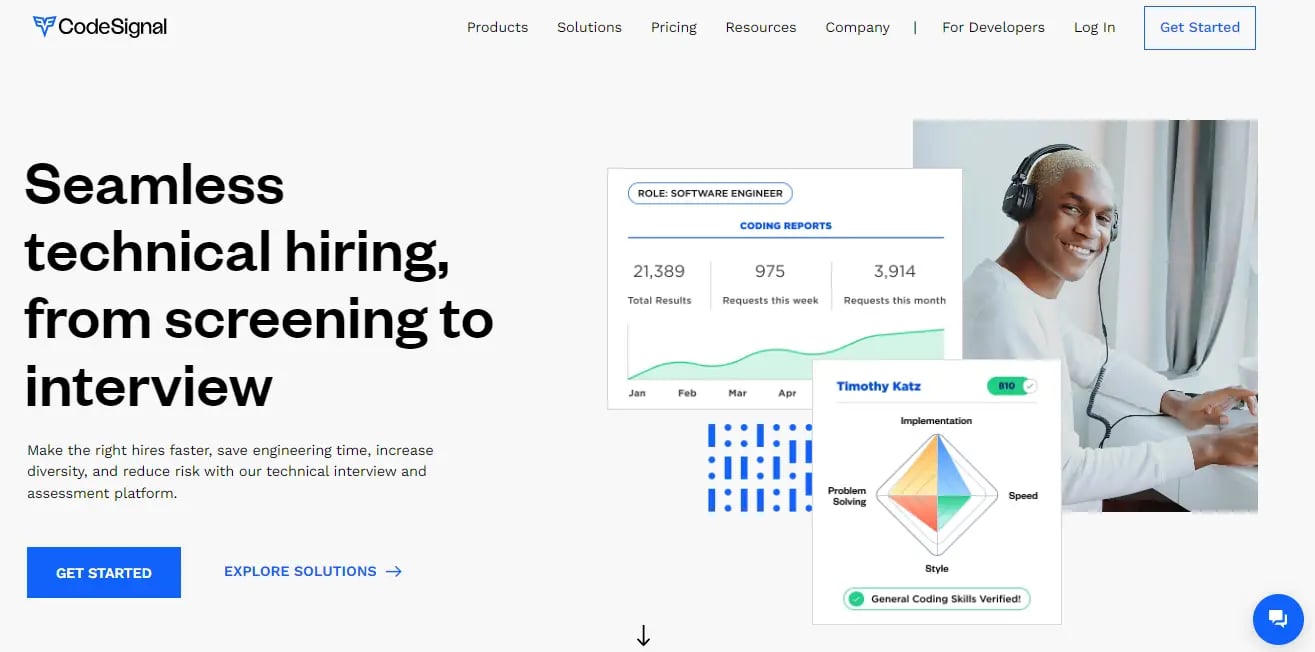In today's digital age, the demand for skilled software developers is at an all-time high. As companies strive to stay competitive and innovate, finding and hiring the best developers has become a top priority. However, identifying the right talent can be a daunting task, given the abundance of candidates and the ever-evolving nature of the tech industry. This is where software developer technical assessments come into play, offering a valuable solution to effectively evaluate and select the most qualified individuals.
Furthermore, a report by LinkedIn states that software development roles are among the top 15 emerging jobs globally. The demand for skilled developers is projected to continue growing rapidly, with an estimated 22% increase in job opportunities in the next decade. Consequently, companies face an immense challenge in screening and selecting candidates who possess the necessary skills and expertise to thrive in this competitive landscape.
In this blog, we will explore the significance of software developer technical assessments in the hiring process. We will delve into the various assessment methods available, examine their advantages and limitations, and provide practical tips on how to leverage these assessments to identify the best developers for your organization. By the end of this article, you will have a clear understanding of how to make informed hiring decisions, resulting in the recruitment of top-notch software developers who will drive your company's success in the digital era.
This is where software developer technical assessments come into play
These tests can provide significant benefits to employers, such as:
- Objective evaluation of a candidate's skills and abilities removes bias from hiring and ensures that the most qualified candidate is selected for the job.
- Better hiring decisions, ensuring that recruiters hire the most qualified candidates, can reduce the risk of turnover and increase productivity.
- Time and cost savings in the hiring process by reducing the number of candidates who need to be interviewed in person. This also helps reduce the time and resources spent on training new hires.
- Accurate skills gap analysis to identify skills gaps within the organization, develop training programs to address these gaps, and hire candidates with the necessary skills to fill these gaps.
- Improved candidate experience by allowing candidates to showcase their skills and abilities and attract top talent.
Further Reading: Wondering whether a software developer technical assessment works for hiring tech talent? This guide is for you.
|
Want to save 80% of your technical screening time? Try iMocha's technical interview tests and filter out irrelevant candidates. |
Software Developers Technical Assessments: Types
1. Coding Challenges and Assignments
Useful for: Evaluating a developer's coding abilities
How to administer them: Through online platforms, the developer is given a task that tests their coding skills. They might be asked to build a particular feature or solve a coding challenge.
The developer is evaluated based on the quality of the code, problem-solving ability, and ability to write efficient and effective code.
2. Technical Skills Assessments
Useful for: Evaluating a developer's technical abilities in a more comprehensive way
How to administer them: Via coding challenges and assignments as well as assessments such as multiple-choice quizzes, open-ended questions, and practical exercises
Technical skills assessments test a developer's understanding of programming concepts and principles, as well as their familiarity with specific programming languages, frameworks, or tools.
One platform that provides software developer technical assessments is iMocha. This online platform offers over 2500+ pre-built assessments to evaluate candidates' technical skills across various programming languages such as Java, Python, C++, and more.
iMocha's technical skills assessments also test candidates for specialized skills such as front-end, back-end, mobile app, and database development.
3. Live Coding Interviews
Useful for: Assessing the developer in real-time where the developer is asked to write code, often while discussing their process with the interviewer
How to administer them: Can be conducted in-person or remotely using online tools
The developer is typically given a problem to solve and then writes code to solve the problem while the interviewer observes and asks questions. Use this feature to evaluate a developer's coding skills, problem-solving ability, and communication skills.
|
Looking to assess developer skills through live coding and programming assessments? Try iMocha! |
Best Practices for Developing Technical Assessments
1. Define the job requirements and skills needed
The first step involves identifying the core competencies, technical knowledge, and skills essential for success in the role.
Obtain this data by conducting job analysis and consultation with subject matter experts (SMEs). Once the key competencies and skills are identified, clearly state them in the assessment to ensure that the candidate's technical abilities align with the job requirements.
2. Create realistic scenarios and projects
A software developer technical assessment should be designed to simulate real-world scenarios and projects that candidates will likely encounter on the job. This ensures the assessment accurately measures the candidate's technical skills and problem-solving abilities.
Pro tip: Realistic scenarios and projects can be developed by SMEs with experience working in the role or by consulting current employees in similar positions.
3. Avoid bias in assessment design and scoring
Bias can creep into technical assessments in many ways, such as through the wording of questions, the selection of topics, and how responses are scored.
To avoid bias, review assessment content and scoring criteria with an objective eye. Additionally, assessments should be piloted with a diverse group of candidates to ensure they are fair and unbiased.
4. Provide clear instructions and expectations
Candidates should be provided with clear instructions on:
- How to access and complete the assessment
- Expectations regarding the time frame for completion
- Scoring criteria
- Consequences of not completing the assessment
Providing candidates with clear expectations can help reduce stress and anxiety, allowing them to focus on their performance.
5. Use automated assessment tools to streamline the process
If you want to reduce the time required to grade assessments, use an automated tool such as coding environments, plagiarism detectors, and machine learning algorithms.
However, it is essential to ensure that these technical screening tools:
- Are reliable and accurate
- Do not introduce bias or errors into the assessment process
- Are used in conjunction with human reviews to ensure that the assessment accurately reflects the candidate's technical skills
| Explore the top 12 technical interview platforms to streamline your tech skills evaluation process. |
Best Practices for Administering Technical Assessments
1. Communicate with candidates about the assessment process
It is important to be transparent with candidates about the assessment process. Communicate what the assessment entails, how it will be evaluated, and how the results will be used.
Let candidates know what tools or software they may need to complete the assessment and provide any relevant resources or materials that they may require.
2. Give candidates sufficient time to complete the assessment
Technical assessments can be time-consuming, so giving candidates enough time to complete them without feeling rushed is important. Be sure to communicate the time limit or deadline for completion, and if possible, offer some flexibility if a candidate needs extra time.
3. Provide feedback and follow up with candidates
Once the assessment is complete, provide timely and constructive feedback to the candidate. This will help them understand:
- How they performed
- What they did well
- Where can they improve
Pro tip: Follow up with candidates who did not pass the assessment to provide feedback on how they can improve and potentially reapply.
4. Ensure fairness and consistency in the assessment process
It is important to ensure that all candidates are given the same assessment and are evaluated in a consistent and fair manner:
- Use objective criteria and scoring rubrics to assess candidates and avoid subjective biases
- Ensure that the assessment aligns with the skills and experience required for the job
5. Protect candidate privacy and data security
Assessments may include personal information and confidential data, so protecting candidate privacy and data security is important. Follow these tips:
- Use secure assessment platforms and follow best practices for data storage and handling
- Be transparent with candidates about how their data will be used and who will have access to it
Tools and Platforms for Conducting Software Developer Online Assessment
1. iMocha
 When it comes to testing the programming skills of candidates, iMocha is one of the best software developer technical assessment tools available in the market. It provides a range of features to make the assessment process seamless and effective:
When it comes to testing the programming skills of candidates, iMocha is one of the best software developer technical assessment tools available in the market. It provides a range of features to make the assessment process seamless and effective:
- Coding Simulator: This feature allows:
- Developers to write and run code in a simulated environment
- Recruiters to assess candidates' coding skills, as well as their ability to debug and fix errors
- AI-LogicBox: An AI-powered tool, AI-LogicBox evaluates developers' logical thinking and problem-solving skills. It offers a repository of over 1500+ questions on topics such as data skills, quality engineering, enterprise application, infrastructure management, cyber security, application development, and more.
- Live Coding Interview: This feature allows recruiters to observe and interact with candidates in real-time as they write and execute code. This feature is particularly useful for evaluating a candidate's ability to:
- Think on their feet
- Collaborate with others
- Communicate effectively
- Coding Interview: The coding interview feature enables hiring managers to:
- Conduct structured interviews with candidates, complete with predefined questions and assessment criteria
- Ensure consistency and fairness in the assessment process
- Access valuable insights into a candidate's programming skills
|
Looking for an effective campus hiring solution? Learn how Capgemini leveraged iMocha and successfully hired 800 freshers with the right technical and functional skills |
2. Codility
 Codility is an online technical assessment platform that empowers recruiters with valid technical interviews, assessment programs, and coding tests. Its top features include:
Codility is an online technical assessment platform that empowers recruiters with valid technical interviews, assessment programs, and coding tests. Its top features include:
- Coding challenges that test a range of programming skills and problem-solving abilities. These challenges are designed to simulate real-world scenarios and are customizable to match the company's hiring needs.
- Automated grading and feedback on the assessment's correctness, efficiency, and readability.
- Plagiarism detection ensures candidates submit original work.
- Real-time collaboration helps candidates and reviewers to interact and ask questions during the assessment process.
- Integrations with popular Applicant Tracking Systems (ATS) and HR platforms allow organizations to incorporate the assessment tool into their existing hiring workflows.
3. TestDome
 TestDome offers work-sample skill tests to hire top talent and avoid bad hires. Its top features include:
TestDome offers work-sample skill tests to hire top talent and avoid bad hires. Its top features include:
- Library of more than 130+ pre-made tests covering a wide range of programming languages, frameworks, and technologies, including Java, Python, C#, JavaScript, SQL, React, Angular, and more
- Customizable tests, allowing recruiters to create their own tests and tailor them to their specific needs by selecting the topics, difficulty level, and duration
- Ability to simulate real-world programming scenarios and help candidates showcase problem-solving and critical-thinking skills
- Anti-cheating measures such as disabling copy-paste, monitoring candidate activity, and recording video and audio of the test-taking session
- Detailed reporting on each candidate's performance, including the number of correct and incorrect answers, time taken to complete the test, and areas of strength and weakness
4. CodeSignal
 CodeSignal offers everything--from initial assessments to technical screens and onsite interviews. The platform provides recruiters with predictive, role-specific Certified Evaluations curated by subject matter experts and validated by IO Psychologists. Its top features include:
CodeSignal offers everything--from initial assessments to technical screens and onsite interviews. The platform provides recruiters with predictive, role-specific Certified Evaluations curated by subject matter experts and validated by IO Psychologists. Its top features include:
- Coding challenges that test a developer's ability to solve real-world problems
- Automated grading to evaluate a developer's solutions to coding challenges.
- Real-time feedback to developers as they work through coding challenges, allowing them to quickly identify and correct errors and learn from their mistakes
- Support for multiple programming languages such as Java, Python, JavaScript, and C++
- A Candidate dashboard allows developers to track their progress through the assessment process. This helps to keep candidates engaged and motivated throughout the process.
In Conclusion
Hiring a software developer requires more than the hiring manager's intuition. Recruiters must augment and accelerate the hiring process by leveraging a personalized automated technical assessment tool.
With one-click access to a world of skills tests and questions, organizations can hire high-performing candidates without breaking a sweat (or the bank).
|
Want to know how Fujitsu reduces their time-to-hire by 50% using the iMocha platform? |
FAQs
What is a software technical assessment?
A software technical assessment is a process of evaluating the technical capabilities of a software developer. Recruiters can assess candidates' knowledge, skills, experience in developing software applications, and ability to solve technical problems and create effective solutions.
The assessment may involve coding challenges, whiteboarding exercises, or project-based assignments, among other evaluation methods.
How do you assess software developer skills?
To assess software developer skills, recruiters and hiring managers can leverage methods such as:
- Technical interviews: Involves asking candidates a series of technical questions to assess their knowledge and understanding of programming languages, frameworks, and technologies
- Coding challenges: These are tasks that candidates are given to complete within a specified timeframe, often under test conditions
- Code reviews: Evaluate a candidate's code to assess its quality, readability, and maintainability
- Project-based assignments: Entail longer-term tasks that involve working on a real-world software development project
What are critical technical and soft skills to look for while hiring a software developer?
The critical technical skills to look for while hiring software developers include:
- Proficiency in programming languages, databases, web development, software design patterns, and software testing methodologies
- Soft skills, such as communication, problem-solving, collaboration, and time management
- Aptitude for learning new technologies
- A strong work ethic
- A passion for software development
|
Want to maximize your campus hiring efforts? Find out how e-Zest assessed 130 students per campus in just 4.5 hours with iMocha's skill intelligent platform. |

